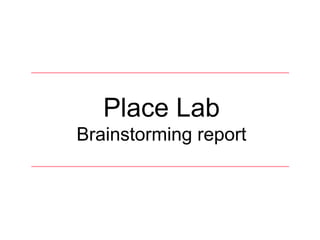Place labs brainstorming report
- 2. Main activities: what does a Place Lab do? âą Addressing social needs serving from textile industry in certain geographical area âą Employment, social status âą Give motivation to social exclusion âą Community building âą Map out the needs, what the place lab will offer âą Make sense, hold ups for problem solving on local area âą Education/skills âą Focus on what people can bring âą Craftsmanship âą Differentiation âą Synergy/Summer school âą Test tinkering âą Produce selling myths âą Fashion/textile education âą Competitions
- 3. Facilities âŁCommon space to experiment âŁSocial space/ community âŁSewing tools âŁTutorials/documentation âŁSample of textiles and accessories âŁKnowledge, libraries âŁLiterature/web/study âŁRepository
- 4. Setting ⣠In geographical areas that have been hit hard by textile manufacturing crisis ⣠In geographical areas of high creativeness/ skills/knowledge ⣠Search where knowledge about T&C is ⣠Census, door to door survey ⣠Team up with other fablabs (hackspaces) ⣠Depend on local situation ⣠Design, manufacture, marketing ⣠Train, exchange & experience ⣠Transnational cooperation, common products ⣠Eco-impact, sense of material, sustainability ⣠Access to fablab network
- 5. Service concepts & tangible results ⣠Start comprehensive ⣠socio-manufacturing service ⣠Innovation service ⣠Place to come together and have fun ⣠Find cross-cutting topics with other sectors ⣠Co-designing of local reality, collaborative & based on collective intelligence ⣠Can be on-line? Yes (ex Etsy) ⣠Tutorial ⣠workshops (zig-zag) ⣠Tangible results: community together
- 6. Audience ⣠Local stakeholders ⣠Cooperatives ⣠Tailors, unemployed, young unemployed, students, home workers ⣠Running institutions ⣠Diversification of labour as strength. ⣠Place labs take up social diversification and strengthen their special opportunities
- 7. Supervision ⣠Shared ownership ⣠Employees volunteers ⣠Supervision depends on the level of support ⣠Give more, ask more ⣠Give nothing, ask nothing
- 8. Sustainability & enviroment ⣠Innovative network, the capital ⣠Start with something that already exsists ⣠Fab-school model ⣠After school? So parents can go to work? ⣠From low tech to high teach teaching ⣠Jobs ⣠Summer schools ⣠On-line shopping platform ⣠Market + social national support ⣠Reuse material for new products
- 9. Fairness ⣠Test models of fair production and fair trade ⣠âManucraftingâ ⣠Danger of the âSocial stigmaâ ⣠Shared ownership?
- 10. Openness ⣠Walk in / walk out










